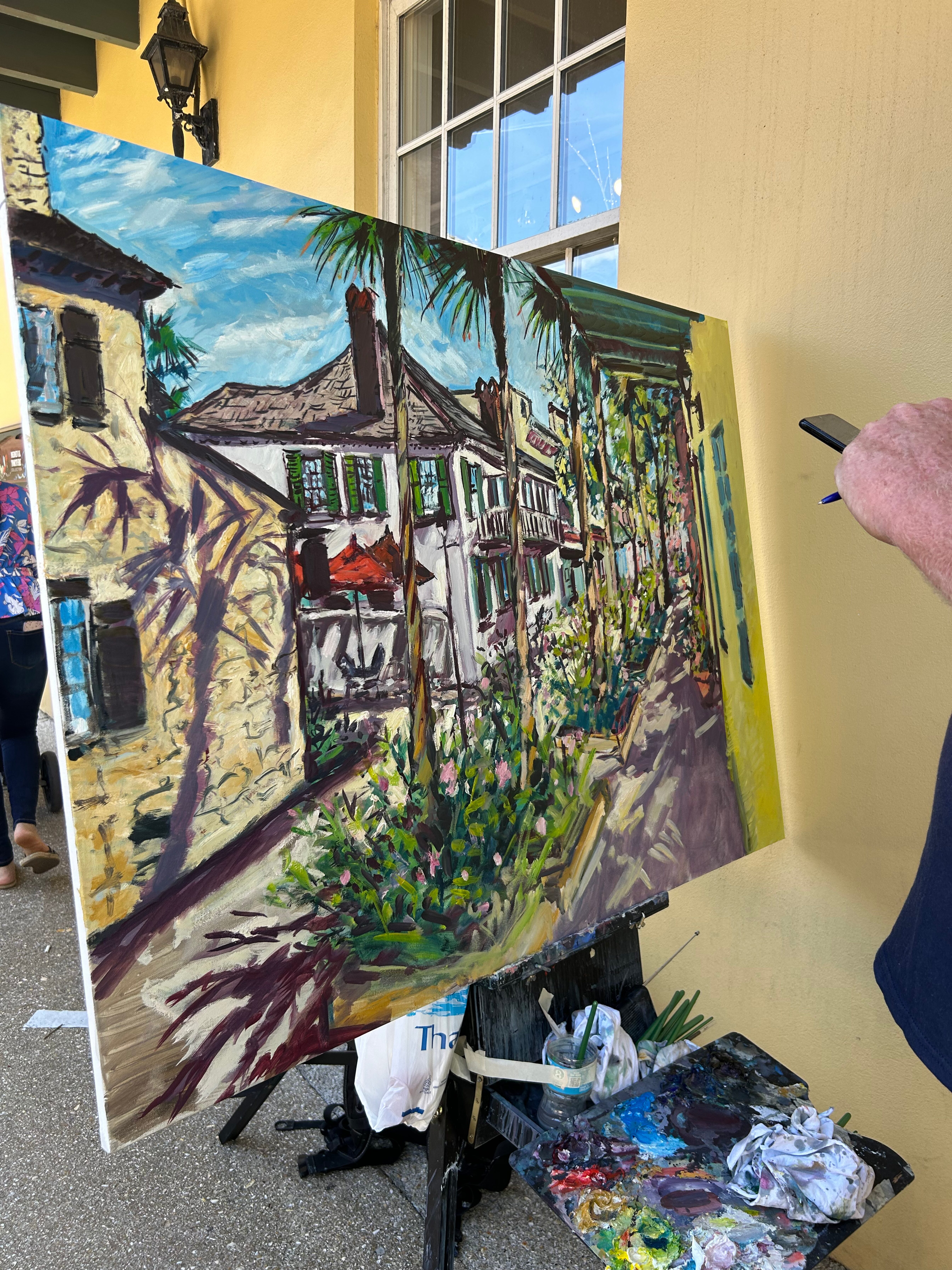By Audrey Helfrich
At age 16, Obadiah Hunter’s view of the world was made more colorful when his grandmother gifted him a Bob Ross oil painting set.
“Every tube of paint had him and his big afro on it,” Hunter the St. Augustine painter while remembering the gift said.
He took up art and couldn’t put it down.
Unfortunately, Hunter’s home burned down when he was a teenager. Everyone got out of the house safely, and he was the last one. When looking through the rubble of his home, the only thing that had survived the fire was his metal box, full of his oil paints and brushes.
“So, I was like ‘oh that’s what I’ve got to go with,’ and I just moved to New Orleans. With just my container of oils and brushes and like $40,” Hunter said. “It all developed from there.”
Painting went from a passion to a lifeline.
Today, you can find Hunter painting on the streets of downtown St. Augustine, where he has lived for almost a year now. He sees the world and translates it to a canvas through oil paint. The “dollhouse” looks of Saint Augustine’s streets and architecture serve as his muse. There is a dreamy, sleepy feeling when you dive into the city through Hunter’s canvas.
There is something inherently interesting about the life of an artist, and we can’t help but wonder why that is. Andy Warhol, creator of pop art in the 1960s, asked this very question as an artist: “Why do people think artists are special? It’s just another job.”
Hunter found a passion at a young age, developed it as he grew older, trusted it enough to let it lead him, and now it funds his life. While art itself is not an endangered activity, the full-time reliance on art to survive is what Hunter considers a dying way of life.
This choice to follow (or not follow) a passion is one that everyone must make, not just artists.
What is so dream-like about artists is that they are doing what they are passionate about and living off it. This pattern of finding a passion and turning it into a business can be done in other careers, not just art.
Hunter’s opinion on Warhol varies. On one hand, the artist said that he was just another worker bee, but Hunter argues that “he said that after he was famous, so that makes what he was saying completely mute.” He points out that, “If he wasn’t famous, no one would have asked him to comment in the first place.”
On the other hand, he believes Warhol was correct in referencing art as a job, because if art is your job, you must treat it like a business.
Hunter’s paintings are hanging in countless St. Augustine local businesses such as Meehan’s Irish Pub, Sweetwater Coffee, The Raintree, Chez Lamour, Juniper Cafe, Spinster Abbots and others. When we walk into these businesses and see a display of art, there is evidence of his time spent on the sidewalk, in the sun, drinking a sugar-free Red Bull, and talking to tourists about why each painting is special to him.
“They are all like my orphans, my children,” he said. “I want them all to go to good homes, but I can’t have like 12 kids hangin’ around. They just get out of control. They aren’t very well behaved.”
The trust that he has put into his work has carried him through over 50 countries, and necessity has fueled over 3,000 paintings.
While it can be found that most American’s are not passionate about their work, it is difficult/impossible to find a study on whether or not artists are passionate about their work. To be an artist implicitly requires passion to fuel action. The artist and columnist Thomas Neel wrote in his article, The Artist’s perspective-Passion,
“Art is not an idea, it is a visual/audible creative action. You only get there by doing…Art is, only because an artist executed an idea into a reality.”
The word “passion” comes from the Latin root “pati” which means “to suffer.” It was used in old French to specifically name the suffering of Christ during his crucifixion.
This image is the most visual way to exemplify that passion is an afflicting pain that we choose to go through for a cause and purpose that is believed to be for the greater good. Modern English uses the word to describe an emotion that leaves a long-lasting desire.
Passion is not a fuzzy feeling that you can relax in, it is something that burns inside until that fire is put out by taking action.
The action taken by artists like Hunter is fueled by a desire to make choices that may or may not be comfortable, so that their work can accomplish something for the greater good.
“I wouldn’t trade it for anything, but at least you are leaving behind a body of work and a legacy,” he said.



Be the first to comment on "To see the world through a canvas"